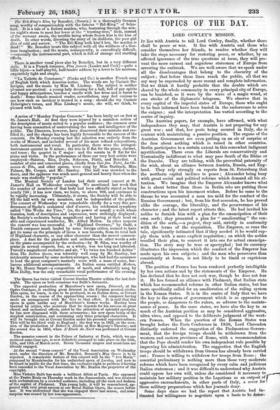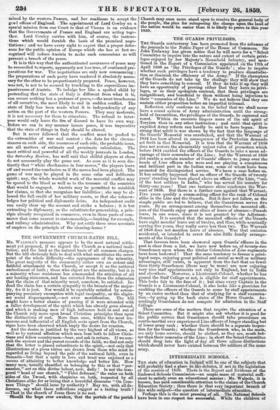TOPICS OF THE DAY.
LORD COWLEY'S MISSION.
IT lies with Austria to tell Lord Cowley, finally, whether there shall be peace or war. It lies with Austria and those who consider themselves her friends, to resolve whether they will take the steps necessary for restoring peace, or whether, by an affected ignorance of the true questions at issue, they will pre- vent the more earnest and sagacious statesmen of Europe from arresting the outbreak. We are well aware that we speak under all the disadvantages that belong to the obscurity of the subject ; that before these lines reach the public, all that we say may be superseded by more recent and complete information. But we think it hardly probable that the doubts which are shared by the whole community in every principal city of Europe, can be banished, as it were by the wave of a magic wand, at one stroke of the diplomatic telegram. We observe that in every capital of the imperial states of Europe, those who ought to be best informed have been busied in the endeavours to solve the enigma ; and the interpretation has varied according to the centre of inquiry.
The Austrian papers, for example, have affirmed, with what independence they may, that Austria is not preparing for any , great war ; and that, her posts being secured in Italy, she is content with maintaining a passive position. The organs of the Austrian Government are even putting on an air of surprise at the fuss about nothing which is raised in other countries. Berlin participates to a certain extent in this somewhat indignant mystification. There even the Liberals are conservatively and Teutonically indifferent to what may pass South of the Rhine or the Danube. They are talking, with the proverbial paternity of the wish, about an alliance between Austria, Russia, and Eng- land. They rely strongly on reports from St. Petersburg that the northern capital inclines to peace ; Alexander being busy with great social and political reforms which demand all his at- tention. We imagine that the Emperor Alexander knows what he is about better than those in Berlin who are putting these constructions upon his innermost wishes. Before he came to the throne he was accounted a man too mild for the conduct of the Russian Government ; but, from his first accession, he has proved alike the courage, the liberality, and the perseverance of his character ; and the latest report attests this. He had invited his nobles to furnish him with a plan for the emancipation of their own serfs ; they presented a plan for " ameliorating" the con- dition of the serfs,—a project, they said, strictly in conformity with the terms of the requisition. The Emperor, so runs the tale, significantly intimated that if they needed it he would sup- ply them with a more explicit requisition; on which the nobles recalled their plan, to convert it into one for actual emancipa- tion. The story may be true or apocryphal ; but its currency illustrates the impression which the conduct of the Emperor has made upon his own subjects ; and the man who perseveres thus consistently at home, is not likely to be timid or capricious abroad.
The position of France has been rendered perfectly intelligible by her own actions and by the statements of the Emperor. He has declared that he does not seek war, though he does not fear it. He has formed an alliance with Piedmont, that Italian state which has recommended reforms in other Italian states, but has more specifically called for an amelioration of the ruling system in the Roman States. It is in the centre of Italy that we have the key to the system of government which is so oppressive to the people, so dangerous to the rulers, so adverse to the mainte- nance of peace. In the same states, we have also the key to so much of the Austrian position as may be considered aggressive, ultra vires, and opposed to the deliberate judgment of the west- ern Powers. When the question of the Roman States was brought before the Paris Conference in 1856, Lord Clarendon distinctly endorsed the suggestion of the Piedmontese Govern- ment, that the foreign troops should be withdrawn from the western and eastern provinces of Rome, with a recommendation that the Pope should render his own independent rule possible by improving his administration. The suggestion that the English troops should be withdrawn from Greece has already been carried out; France is willing to withdraw her troops from Rome ; the essential preliminary is nothing more than those very moderate reforms which have been recognized by every calm and judicious Italian statesman ; and it was difficult to understand why Austria could oppose her own will, unless she considered it necessary to maintain her military position in the Legations as an outpost of aggressive encroachments, in other parts of Italy, a cozer for those military preparations which her journals deny. Some days since we had the report that Austria had in- timated her willingness to negotiate upon a basis to be deter- mined by the western Powers, and her readiness to accept the gcol offices of England. The appointment of Lord Cowley on a special mission from our Court to that of Vienna is an evidence that the Governments of France and England are acting toge- ther. Lord Cowley carries with him, of course, the instruc- tions which would furnish the basis of the promised nego- tiations; and we have every right to expect that a proper defer- ence for the public opinion of Europe which she has at last re- cognized will induce Austria to make such concessions as will prevent a breach of the peace.
It is in this way that the authenticated assurances of peace may be reconciled to reports, apparently not less true, of continued pre- parations for war. The negotiations are only now commencing ; the preparations of each party have rendered it absolutely neces- sary for the other to be proportionately prepared. Peace, however, was not, is not to be secured by truckling to the supercilious im- passiveness of Austria. To indulge her like a spoiled child by pretending that the state of Italy is different from what it is, can secure nothing but a pretence of peace,—the most treacherous of all securit'es, the most likely to end in sudden conflict. The state of Italy has been made what it is independently of any action on the part of the western Powers. They may moderate, it is not necessary for them to stimulate. The refusal to inter- pose would only leave the fire of discord to have its own way. Before we can in any manner insure peace, it was imperative that the state of things in Italy should be altered.
But it never followed that the conflict must be pushed to the extremities of war and contest ; the data for the circum- stances on each side, the resources of each side, the probable issue, are all matters of estimate and proximate calculation. The most critical and powerful of all the weekly journals in London, the Saturday Review, has well said that skilful players at chess do not necessarily play the game out. As soon as it is seen dis- tinctly that "white checkmates in four moves," the players leave off and record the conclusion as if the moves had been played. The game of war may be played in the same calm and deliberate spirit ; nay, the whole wasteful work of the material conflict may he spared to the blood as well as to the treasure of the countries that would be engaged. Austria may be permitted to establish her claims, so that she recognises her liabilities ; she may be al- lowed the full credit of her military assets, so that she acknow- ledges her political and diplomatic debts. An independent audit can easily clear up the account and strike a balance ; it is but extending to diplomacy, as the substitute for generalship, a prin- ciple already recognized in commerce, even in those parts of com- merce that come nearest to statesmanship,—banking for example, and railway administration. Why not settle these cross accounts of empires on the principle of the clearing-house ?



































 Previous page
Previous page